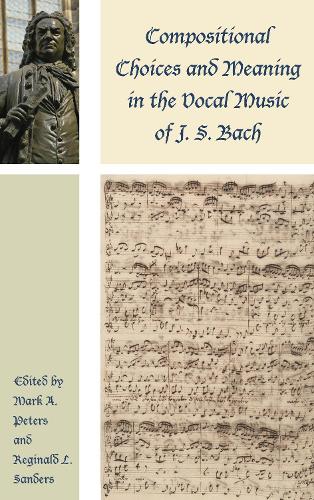
Compositional Choices and Meaning in the Vocal Music of J. S. Bach
(Paperback)
Available Formats
Publishing Details
Compositional Choices and Meaning in the Vocal Music of J. S. Bach
By (Author) Mark A. Peters
Edited by Reginald L. Sanders
Foreword by Robin A. Leaver
Contributions by Wye J. Allanbrook
Contributions by Gregory Butler
Contributions by Eric Chafe
Contributions by Jason B. Grant
Contributions by Mary Greer
Contributions by Tanya Kevorkian
Contributions by Robin A. Leaver
Bloomsbury Publishing PLC
Lexington Books
6th July 2020
United States
Classifications
Professional and Scholarly
Non Fiction
Musicians, singers, bands and groups
Art music, orchestral and formal music
Music reviews and criticism
Singing: techniques
780.92
Physical Properties
Paperback
354
Width 155mm, Height 231mm, Spine 22mm
572g
Description
Compositional Choices and Meaning in the Vocal Music of J. S. Bach collects seventeen essays by leading Bach scholars. The authors each address in some way such questions of meaning in J. S. Bachs vocal compositionsincluding his Passions, Masses, Magnificat, and cantataswith particular attention to how such meaning arises out of the intentionality of Bachs own compositional choices or (in Part IV in particular) how meaning is discovered, and created, through the reception of Bachs vocal works. And the authors do not consider such compositional choices in a vacuum, but rather discuss Bachs artistic intentions within the framework of broader cultural trendssocial, historical, theological, musical, etc.
Such questions of compositional choice and meaning frame the four primary approaches to Bachs vocal music taken by the authors in this volume, as seen across the books four parts: Part I: How might the study of historical theology inform our understanding of Bachs compositional choices in his music for the church (cantatas, Passions, masses) Part II: How can we apply traditional analytical tools to understand better how Bachs compositions were created and how they might have been heard by his contemporaries Part III: What we can understand anew through the study of Bachs self-borrowing (i.e., parody), which always changed the earlier meaning of a composition through changes in textual content, compositional characteristics, the works context within a larger composition, and often the performance context (from court to church, for example) Part IV: What can the study of reception teach us about a works meaning(s) in Bachs time, during the time of his immediate successors, and at various points since then (including our present)
The chapters in this volume thus reflect the breadth of current Bach research in its attention not only to source study and analysis, but also to meanings and contexts for understanding Bachs compositions.
Reviews
Don Franklin is a preeminent Bach scholar, and this volume of enlightening case studies on meaning in Bachs vocal music by his colleagues and former students is a marvelous tribute that does both Franklin and Bach a signal honor. -- Michael Marissen, author of Bach & God
An admirable set of essays about an important body of music. Taken together, this collection significantly advances scholarly discourse about the vocal works of J. S. Bach. -- Stephen Crist, Emory University
Author Bio
Mark A. Peters is professor of music at Trinity Christian College.
Reginald L. Sanders is professor of music at Kenyon College.
